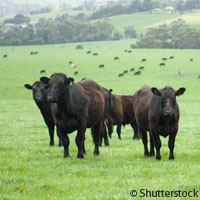New EU-funded food safety project launched
Securing the quality and safety of animal feeds in Europe is the aim of new research about to be carried out by a pan-European team of researchers. The project, titled QSAFFE ('Quality and Safety of Feeds and Food for Europe'), has received EUR 3 million of EU funding under the 'Food, agriculture and fisheries, and biotechnology' Thematic area of the Seventh Framework Programme (FP7). The study will be led by the Centre for Assured, Safe and Traceable Food (ASSET) at Queen's University, UK, and will see 11 partner institutions from Belgium, China, the Czech Republic, Germany, the Netherlands and the UK come together with the common aim of delivering better, faster and more economically viable means of ensuring the quality and safety of animal feeds in Europe. The rearing of healthy European livestock is highly dependent on the provision of high quality and safe feeds, which in turn has a major impact on the safety of the entire animal based food chain. Professor Chris Elliott, Director of ASSET and coordinator of the QSAFFE project said: '"You are what you eat" is a mantra that is often applied to human food consumption. As consumers become more concerned about where their food comes from, the same mantra should be applied to the livestock that produce much of our food.' The launch of this project comes in the wake of two recent dioxin crises in Europe, both of which were linked to dioxin contamination of animal feed and the inability to detect such contaminations for weeks or even months after they occurred. The project will be carried out by a consortium, made up of academics, government scientists as well as both large and small industrial feed supply companies. Their aim is to work towards developing an integrated approach to reducing and managing chemical and microbiological contamination in animal feeds. By fostering links between academia and the industry itself, the researchers hope to improve contamination and fraud prevention, as well as identify and assess new risks. They will provide scientific evidence of the risks surrounding the transfer of microbiological and chemical contaminants from feed to food. Declan Billington, Chief Executive of Belfast-based animal feed producers John Thompson and Sons Ltd, one of the leading industrial partners in the project, said: 'Agri-food has long been, and will continue to be, one of the cornerstone industries of Northern Ireland. For too long, the food industry globally has been on the back foot, with innovation in food safety arising as a response to food scares, rather than in advance of them.' The project will also map out strategies for early quality and safety assurance in the feed chain using existing testing methods and emerging technologies such as fingerprinting to deliver a comprehensive analytical strategy for monitoring at ports, feed mills and labs. The traceability and authenticity of feed materials will be improved by determining which tests, conventional, and spectroscopic or isotopic fingerprinting, will be most useful in tracing origins of feed materials including those derived from biofuel co-products. Emerging chemical and microbiological risks will be identified from new types and sources of animal feed materials and new production processes. These will direct the development of rapid, low-cost screening tests which will ensure quality and safety standards are met. The transfer of chemical contaminants such as melamine and dioxins and microorganisms (e.g. Salmonella spp. or Listeria monocytogenes) from feed to food will be studied using pharmacokinetic models and animal studies to provide risk assessments for regulators. The safe production and handling of animal feed has a huge impact on the health of livestock, as well as on what consumers find on their plates. Preventing food fraud, ensuring produce traceability, identifying risks to the food chain, and developing new technology for use at ports and factories to detect contamination quickly and cheaply, will all have a positive effect on the quality of meat, milk and other animal-based food products in Europe.For more information, please visit:Queen's Universityhttp://www.qub.ac.uk
Countries
Belgium, China, Czechia, Germany, Netherlands, United Kingdom



